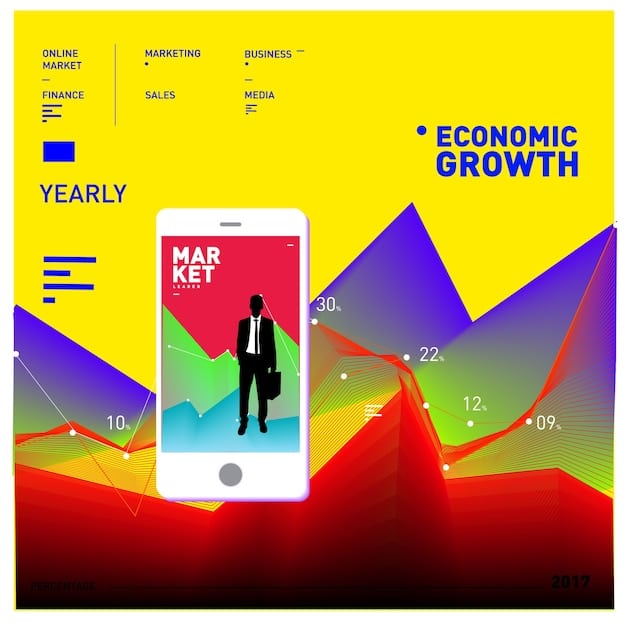The Impact of Social Media on Movie Marketing in 2025

Advertisements
In 2025, social media’s influence on movie marketing campaigns will intensify, driven by personalized advertising, interactive content, and data-driven insights, transforming how studios connect with audiences and build anticipation for new releases.
The landscape of movie marketing is rapidly evolving, and by 2025, the impact of social media on movie marketing campaigns will be more profound than ever before. As digital platforms continue to dominate consumer attention, studios are increasingly leveraging social media to connect with audiences, build buzz, and drive ticket sales. Let’s explore the upcoming trends.
The Evolution of Movie Marketing Strategies
Traditional movie marketing relied heavily on television commercials, print ads, and billboards. However, the rise of social media has disrupted these established methods, offering new and innovative ways to reach potential viewers. This section explores how strategies have evolved.
As audiences spend more time online, movie studios have shifted their focus towards digital platforms like Facebook, Instagram, Twitter, and TikTok. These platforms provide targeted advertising opportunities and allow filmmakers to engage directly with their fans. Interactive campaigns, viral content, and influencer partnerships have become essential components of modern movie marketing.
From Broadcast to Engagement
The shift from broadcast to engagement represents a fundamental change in movie marketing. Instead of simply pushing out information, studios now aim to create meaningful interactions with potential viewers. This involves encouraging user-generated content, hosting online Q&A sessions, and fostering a sense of community around the movies.
Measuring Social Impact
Another important aspect of the evolution is the ability to measure the impact of social media campaigns. Advanced analytics tools allow studios to track metrics such as engagement rates, reach, and sentiment. This data-driven approach enables them to optimize their strategies and make informed decisions about where to allocate their resources.

- Increased Engagement: Social media provides direct interaction with target audiences.
- Data-Driven Insights: Analytics offer precise measurement of campaign effectiveness.
- Cost-Effective Reach: Social media often provides a broader reach at a lower cost compared to traditional media.
In conclusion, the evolution of movie marketing strategies reflects the increasing importance of social media in reaching and engaging audiences. By embracing digital platforms and data-driven approaches, studios can create more effective campaigns and build stronger connections with their fans.
Personalized Advertising: Targeting the Right Audience
One of the key advantages of social media is the ability to deliver personalized advertising to specific audience segments. This section delves into how personalized ads work and the future of targeted campaigns.
By leveraging data about user demographics, interests, and online behavior, studios can create targeted ads that are more likely to resonate with potential viewers. This approach not only maximizes the effectiveness of marketing campaigns but also enhances the user experience by delivering content that is relevant and engaging.
The Role of Data Analytics
Data analytics plays a crucial role in personalized advertising. By analyzing vast amounts of user data, studios can identify patterns and tailor their ads accordingly. This may involve showcasing different trailers or highlighting specific aspects of a movie that are likely to appeal to different audience segments.
Ethical Considerations
As personalized advertising becomes more sophisticated, it’s important to address ethical considerations related to data privacy and transparency. Studios need to be transparent about how they collect and use user data, and they should give audiences control over their privacy settings. Maintaining trust is essential for long-term success.
- Enhanced Relevance: Personalized ads are more relevant to individual interests, increasing the likelihood of engagement.
- Improved ROI: Targeted campaigns can deliver a higher return on investment by focusing on the most receptive audiences.
- Ethical Responsibility: Transparent data practices are crucial for building and maintaining trust with consumers.
In summary, personalized advertising offers a powerful way to target the right audience and improve the effectiveness of movie marketing campaigns. By leveraging data analytics and adhering to ethical principles, studios can create more meaningful connections with potential viewers.
Interactive Content: Engaging Viewers in New Ways
Interactive content is transforming the way movie studios engage with audiences. This section explores the variety of interactive formats being used today.
Instead of passively watching trailers and reading reviews, viewers can now actively participate in the movie experience through interactive games, virtual reality (VR) experiences, and augmented reality (AR) filters. These formats create a sense of immersion and excitement that can significantly boost audience engagement.

VR and AR Experiences
Virtual reality (VR) and augmented reality (AR) offer unique opportunities to create immersive movie experiences. VR can transport viewers into the world of the movie, while AR can overlay digital elements onto the real world, creating interactive and engaging experiences.
Social Media Challenges and Filters
Another popular form of interactive content is social media challenges and filters. These challenges encourage viewers to create and share their own content related to the movie, while filters provide a fun and creative way to express their fandom. These initiatives can generate significant buzz and user-generated content, amplifying the reach of marketing campaigns.
- Enhanced Immersion: Interactive formats provide a deeper and more engaging experience.
- User-Generated Content: Social media challenges and filters encourage fans to create and share their own content.
- Increased Buzz: Interactive campaigns can generate significant buzz and excitement around the movie.
In conclusion, interactive content represents a powerful way to engage viewers and create a sense of excitement around movies. By embracing VR, AR, and social media challenges, studios can deliver unique and memorable experiences that resonate with audiences.
Influencer Marketing: Leveraging Social Authority
Influencer marketing has become an integral part of movie marketing campaigns. This section examines the role of influencers in reaching audiences.
By partnering with social media influencers who have a large and engaged following, studios can tap into their existing audience base and leverage their credibility to promote movies. Influencers can create sponsored content, attend premieres, and participate in social media campaigns, helping to generate awareness and drive ticket sales.
Finding the Right Influencers
Finding the right influencers is crucial for the success of these partnerships. Studios need to identify influencers who align with their target audience and have a genuine interest in the movie. Authenticity is key, as audiences can quickly recognize sponsored content that feels forced or insincere.
Measuring Influencer Impact
It’s also critical to measure the impact of influencer campaigns. This involves tracking metrics such as reach, engagement, and conversions. By analyzing this data, studios can determine which influencers are most effective and optimize their strategies accordingly.
- Authentic Endorsements: Genuine influencer partnerships build trust with audiences.
- Targeted Reach: Influencers reach specific demographics, improving campaign relevance.
- Measurable Results: Performance metrics help studios optimize influencer marketing strategies.
In summary, influencer marketing offers a powerful way to leverage social authority and reach a wider audience. By carefully selecting influencers and measuring the impact of their campaigns, studios can generate awareness and drive ticket sales for their movies.
Data-Driven Decisions: Analytics in Movie Marketing
Data analytics is revolutionizing the way movie marketing decisions are made. This section examines the use of data in driving marketing strategies.
By analyzing data from social media platforms, online surveys, and ticket sales, studios can gain valuable insights into audience preferences, campaign performance, and market trends. This data-driven approach enables them to make informed decisions about advertising, content creation, and distribution strategies.
Predictive Analytics
Predictive analytics is a particularly powerful tool for movie marketing. By analyzing historical data, studios can predict future trends and anticipate audience responses to their campaigns. This allows them to proactively adjust their strategies and maximize their chances of success.
A/B Testing
A/B testing is another common technique used in data-driven marketing. By testing different versions of ads, trailers, and social media posts, studios can identify which elements are most effective at driving engagement and conversions.
- Informed Strategies: Data insights drive smarter, more effective marketing campaigns.
- Predictive Power: Anticipating audience response through data analysis.
- Optimized Content: Testing variations to maximize audience engagement.
In conclusion, data-driven decisions are essential for successful movie marketing in 2025. By leveraging analytics and predictive modeling, studios can gain a deeper understanding of their audience and optimize their strategies for maximum impact.
The Role of Emerging Platforms: TikTok and Beyond
Emerging platforms like TikTok are playing an increasingly important role in movie marketing campaigns. This section explores the potential of these platforms.
With their short-form video format and highly engaged user base, TikTok and similar platforms offer unique opportunities to reach younger audiences and generate viral buzz. Studios can create branded challenges, collaborate with TikTok influencers, and launch creative campaigns that resonate with the platform’s unique culture.
Adapting to New Trends
Adapting to new trends and emerging platforms is crucial for staying ahead in the ever-evolving landscape of social media. Studios need to be nimble and willing to experiment with new formats and strategies to capture the attention of digital-savvy audiences.
Opportunities for Innovation
Furthermore, emerging platforms often provide opportunities for innovation. Studios can leverage new features and tools to create unique and engaging content that sets their movies apart from the competition.
- Youthful Engagement: Platforms like TikTok capture younger demographics effectively.
- Viral Potential: Short-form video formats enhance the likelihood of viral buzz.
- Innovative Opportunities: New platforms offer fresh avenues for creative content.
In summary, emerging platforms like TikTok are transforming movie marketing by providing new ways to reach and engage audiences. By embracing these platforms and adapting to new trends, studios can generate viral buzz and drive ticket sales for their movies.
Future Trends in Movie Marketing
As we look ahead to 2025 and beyond, several key trends are poised to shape the future of movie marketing.
This section explores the integration of AI, the rise of hyper-personalization, and the increasing importance of community building.
AI-Powered Marketing
Artificial intelligence (AI) is already playing a role in movie marketing, and its influence will only grow in the coming years. AI can be used to automate tasks such as ad targeting, content creation, and sentiment analysis, freeing up marketers to focus on more strategic initiatives.
The Hyper-Personalization Era
Hyper-personalization will become even more sophisticated, with studios tailoring their marketing messages to individual viewers based on their unique preferences and behaviors. This will involve leveraging AI-powered recommendation engines and advanced data analytics techniques.
Community Building
Finally, community building will become increasingly important as audiences seek out more authentic and engaging experiences. Studios will need to foster a sense of community around their movies by encouraging interaction, hosting online events, and empowering fans to become brand ambassadors.
- AI Automation: Streamlining marketing tasks with artificial intelligence.
- Hyper-Personalization: Targeting individual preferences for greater engagement.
- Community Focus: Building loyalty and advocacy through community initiatives.
In conclusion, the future of movie marketing will be shaped by AI, hyper-personalization, and community building. By embracing these trends and adapting to new technologies, studios can create more effective and engaging campaigns that resonate with audiences and drive ticket sales.
| Key Point | Brief Description |
|---|---|
| 🎯 Personalized Ads | Targeting ads based on user data improves engagement. |
| 🎮 Interactive Content | VR/AR experiences engage viewers. |
| 🎤 Influencer Marketing | Influencers boost movie awareness. |
| 🤖 AI Marketing | AI automates marketing tasks. |
FAQ
▼
Social media is shifting movie marketing from traditional methods to more interactive and personalized strategies. It allows for direct engagement with audiences and offers data-driven insights for better targeting and campaign optimization.
▼
Influencers play a crucial role by leveraging their established credibility and engaged followings. They help studios connect with specific demographics authentically, generating buzz and driving ticket sales through sponsored content and campaigns.
▼
Personalized advertising utilizes user data to tailor movie ads to individual interests. This approach maximizes campaign effectiveness by delivering content that resonates more deeply, enhancing user experience by showcasing relevant trailers and features.
▼
Examples include VR and AR experiences that immerse viewers in the movie’s world, social media challenges that encourage user-generated content, and interactive filters that allow fans to creatively express their fandom, amplifying the movie’s reach.
▼
Data analytics offers invaluable insights into audience preferences, campaign performance, and market trends. This allows for data-driven decisions on advertising, content creation, and distribution strategies, optimizing the overall marketing impact and ROI.
Conclusion
As we move closer to 2025, social media will undoubtedly remain a critical component of movie marketing campaigns. Studios that embrace personalized advertising, interactive content, data-driven insights, and collaboration with influencers will be best positioned to connect with audiences, build buzz, and drive box office success.





